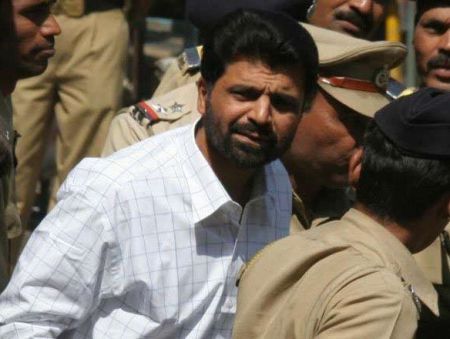The tragedy is that, at least on social media, the narrative that was being lapped up by many Indian Muslims was that Yakub Memon was being victimised. The purveyors of this poisonous line of thinking want this sentiment to grow since communal polarisation is the primary pillar of their political strategy, says Sushant Sareen.

The most troubling aspect of the sinister and manufactured outrage of the usual suspects over the hanging of a mass murderer, Yakub Memon, is how easily this fringe group is able to impose itself on the national narrative and build pressure to short-circuit, stall and sabotage even a transparent, if also torturous, judicial process.
This is precisely what happened in the case of Afzal Guru and now in the case of Memon. The last minute challenges against the death sentence, which if allowed would have tied the legal system in an ad infinitum cycle of ruling followed by challenge followed by mercy petition followed by challenging the rejection of mercy petition and so on and so forth, were only aimed at making a mockery of the judicial system.
It goes to the credit of the government and the judiciary that it did not succumb to the falsehoods and disingenuous arguments that these fringe elements forwarded in the defence of a mass murderer responsible for the deaths of hundreds of Indians.
But the entire spectacle surrounding the Yakub Memon case raises serious questions -- and this was raised by a young Facebook friend -- about how a country, which seems jittery about hanging a convicted terrorist, can ever fight terrorism, much less defeat it.
Despite all the deflection, obfuscation, double-speak, twisting of facts and inventing of facts, conjuring up evidence which did not exist, specious logic and blatant lies that was employed in the defence of Memon, the sheer weight of evidence against him was so overwhelming and his crime so unpardonable, that there was really no way that he could have escaped the gallows.
While it is easy to understand where conscientious objectors to the death penalty are coming from and one can agree to disagree with them, what is mindboggling is the logic that was forwarded by those who argued that Memon was being hanged because he was a Muslim or that he was not an integral part of the 1993 bomb blasts conspiracy or that he had been offered a deal by the investigating agencies and that's why he came back, or that the bomb blasts must be seen in the context of the Babri demolition and subsequent riots in Mumbai (as if this was a mitigating factor!) or even that since so many other criminals and murderers have managed to evade the death sentence -- the Khalistani terrorist Balwant Singh Rajaona for example -- therefore so should Memon.
Almost all these arguments are pure nonsense.
The entire case against Memon's execution was sought to be based on a Rediff.com article written by the former Research and Analysis Wing official B Raman who expressed his opinion -- note, it was only his opinion -- that Memon should not be hanged.
Raman did write that he organised the logistics for bringing Memon into India from Nepal. But since when has organising logistics come to mean that Memon was offered a deal by Indian officials?
Raman has very clearly written that not only did he consider Memon guilty, but also that Memon was not surrendering and was going back to Karachi when he was apprehended by the Nepalese authorities and handed over to India. And yet, Memon's defenders keep mouthing the lies that he had surrendered.
It is also touching to see how these usual suspects who never let go off any opportunity to undermine and question the credibility of officials of law enforcement and intelligence agencies so readily lap up an opinion of an official of these very agencies simply because it suits them.
Strangely, while Raman's opinion is accepted as the unalloyed truth, the testimony and opinions of dozens of other officials who were directly involved in the investigation is rejected out of hand because it doesn't suit their agenda.
Even more strange is how all these people never opened their mouth in the 22 odd years while the trial was underway, but as soon as the day of judgement approached, this entire lot of usual suspects who have made it their mission in life to promote and protect all those who damage India, come out of the woodwork and start a clamour in the defence of a Yakub Memon.
Where was their activism when the trial was going on?
Why did they not speak up then?
If they felt so strongly about Memon's innocence, why did they not stand up in court to defend him? No answer is ever forthcoming.
It is now being said that Memon was offered a deal and that is why he came back. Now anyone with even a modicum of knowledge of how the criminal justice system works knows that there is a process and procedure by which someone is made a prosecution witness on the promise of reduced charges.
How come if Memon was offered a deal and the prosecution reneged on it his defence, his lawyers never mentioned this before the judge when the chargesheet was filed against him? Surely, this matter should have been raised then and if there was some breach of trust by the investigators it should have been brought to the notice of the judge. But this was never done. To raise this issue now is a simple dissemble.
Raman also writes that Memon cooperated after his arrest. Did he have a choice? Be that as it may, the legal challenge to Memon's execution had really no legs to stand on. But there was a political argument which was also made in an effort to get him off the gallows, only it was mostly just as specious as the legal argument.
The most pernicious part of the political argument was the attempt to project Memon as a victim of 'cruel' and 'biased' justice system who was being punished because he was a Muslim. As such he was being projected as some sort of Muslim icon, which he clearly was not. Nor for that matter was his case some kind of Muslim cause celebre, though it was sought to be presented as such.
In the process his crime was sought to be either glossed over or explained away or even justified by presenting it as a cause (the Babri Masjid demolition and the Mumbai riots) and effect (bomb blasts) thing.
To equate Memon with rest of Indian Muslims is a grave injustice to the entire community because it lumps the community with the perpetrators of a horrible crime as their sympathiser and supporter, which is nothing but a travesty.
The simple fact was that Memon was hanged not because he was a Muslim but because he participated in mass murder. He might have carried out his crime because he felt it was his religious obligation, but the punishment he was meted out was for his crime not his creed.
The tragedy, however, is that, at least on social media, the narrative that was being lapped up by many Indian Muslims was that Memon was being victimised. The purveyors of this poisonous line of thinking, of course, want this sentiment to grow since communal polarisation is the primary pillar of their political strategy and is getting them traction among sections of Indian Muslims.
The effort to explain away, even justify, the bomb blasts as an action-reaction thing is clearly untenable. Apart from the old cliche that two wrongs don't make a right, if this action-reaction proposition is accepted then everything can be justified -- Gujarat riots because they were a reaction to the Godhra train burning, the anti-Sikh riots because they were a reaction to Indira Gandhi's assassination, Rajiv Gandhi's assassination because of the Indian Peace Keeping Force's operations in Sri Lanka, it is an endless list in which even the Babri demolition can be justified as reaction for the demolition of Ram temple hundreds of years ago because in this logic the cut-off point of history is whatever suits you.
The argument that since the main conspirators Tiger Memon and Dawood Ibrahim haven't been brought to justice, Yakub Memon shouldn't be punished also doesn't stand the test of reason. In law the fact that someone else has managed to evade justice doesn't mitigate the gravity of the crime of the person who hasn't been able to run away.
Even the fact that other murderers and terrorists like Rajaona have managed to evade capital punishment because of political expediency doesn't justify Memon getting a reprieve. While there is undeniably a miscarriage of justice when an unrepentant terrorist like Rajaona isn't hanged, it doesn't mean that the same miscarriage of justice be extended to every such criminal. If anything, Memon's hanging should become a template for justice being delivered on Rajaona.
It is precisely to prevent this perceived double-standard that the sort of discretion that is bestowed upon the judiciary through the dictum of the death penalty in only the 'rarest of rare' cases must end. If the statute books lay down the death penalty for certain crimes, then that should be the sentence for anyone found guilty of the crime.
If another mass murder -- the Nithari monster -- can have his death sentence commuted, then there is something clearly wrong with how this penalty is being imposed. Those who point to the apparent inconsistency on the part of judges in handing out the death penalty do have a case, only it is not a case against capital punishment but in not allowing discretion in pronouncing the death sentence according to the predilections of the judges.
Finally, there is the whole argument that the death penalty is no deterrence. This is at best a half truth. Come to think of it, no criminal penalty is a deterrence. If it was then given that there are punishments listed for every crime, no crime would ever be committed.
For instance, the existence of rape laws or even sexual harassment laws hasn't stopped either rape or sexual harassment. Surely then it can be nobody's argument that rape laws be scrapped.
People commit crimes when they think they can get away with it. This is then more a function of the manner in which the criminal justice system operates, taking decades to settle cases which keep meandering endlessly. There is, of course, no guarantee that if swift justice was to visit the criminals crimes wouldn't be committed, but it would deter many potential criminals.
The argument that some 100 countries have abolished the death penalty and how low crime rates is again a half truth because it doesn't take into account a whole host of other issues like their stage of development, the delivery and provision of social goods, the levels of education etc.
Most civilised societies which have been liberalising their laws, but continue to face the challenge of deterring crime need to ask the question as to how barbaric dispensations like the Taliban and Islamic State are able to enforce their laws but modern nation States are faltering and fumbling in enforcing theirs.
Are modern societies missing something that people with medieval mindsets have figured out?
If capital punishment isn't a deterrence, how are these medieval barbarians able to impose their law while civilised societies fail to do the same?
Sushant Sareen is a Senior Fellow at the Vivekananda International Foundation.










